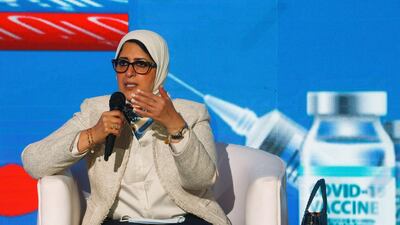As introduction of Covid-19 vaccines begin across the world, one would be forgiven for thinking that Egypt was well placed to efficiently inoculate its population of more than 100 million.
The Arab world’s most populous country is known for its effective vaccination programmes against preventable diseases such as measles, whooping cough and diphtheria. The anti-polio campaign, for example, was a huge success; Egypt has been polio free since 2006.
According to the World Health Organisation, more than 90 per cent of the population has been covered under Egypt's free-to-all Expanded Programme of Immunisation (EPI) programme.
But the coronavirus pandemic is posing a different challenge: to convince a sceptical population that the vaccines are safe in the face of anxiety and misinformation turbocharged by social media.
Egypt plans to begin inoculations this month with the vaccine produced by China National Pharmaceutical Group (Sinopharm). The company said its vaccines showed 79.34 per cent efficacy in late-stage trials.
The Egyptian health ministry said the Sinopharm vaccine would start to be distributed in the second week of January, starting with medical workers, people above the age of 65 and those with chronic diseases. The three categories constitute roughly 20.5 million people, according to official data.
Egypt has also applied to receive vaccines through the WHO's Covax scheme.
But it apparently will take more time to convince Egyptians to take the vaccine than with previous shots, despite a vast body of evidence that those approved so far are safe.
The National spoke to people from different social and education backgrounds, some of them with underlying medical conditions. While they were all tired of coronavirus restrictions and eager to hear good news about the vaccines, many of them were hesitant about getting vaccinated themselves.
"I think everybody is acting in haste to combat the coronavirus," Lamia, a 44-year-old mother of three in the capital Cairo, told The National. "There's a consensus among my friends and family members to wait a bit until we become fully informed of the side effects. You are injecting a virus into your body."
Several companies around the world have reported positive results in trials for vaccines approved so far by health regulators.
The vaccines were all created in less than a year as scientists, backed by massive financial and logistical resources, acted nimbly to confront a disease that has claimed more than 1.5 million lives globally. The death and infection rates are showing no signs of slowing down.
Egypt's daily coronavirus caseload has been increasing steadily in recent weeks. The health ministry has recorded more than 127,000 cases and deaths have exceeded 7,100 . Limited testing of the general population has stoked fears that cases are going undetected and the real number of infections is perhaps far higher.
"We don't have anti-vaxxers in Egypt per se, but there's widespread concern because most of the people don't know the scientific rationale behind the Covid-19 vaccines," Dr Islam Anan, an Egyptian pharma-epidemiologist, told The National.
Dr Anan was referring to a global movement against vaccines known as anti-vaxxers. These sceptics of vaccinations and most science in general range from lay people to celebrities and politicians.
Social media is rife with misinformation that goes as viral as the virus itself, from how the virus was engineered in a lab by the Chinese government to a plan by Microsoft founder Bill Gates to implant trackable microchips in people under the guise of vaccinations.
In July last year, Formula One champion Lewis Hamilton shared an anti-vaccine post with his 18 million followers on Instagram that suggested foul play in the clinical trials.
In the Arab world, Lebanese singer Carole Samaha claimed in a tweet last May that there had been furious horse-trading between parties she did not name to strike a “historic deal” by creating the virus, with a hashtag saying "no to vaccination".
A month earlier, former mufti of Egypt Ali Gomaa stirred controversy when he said the creation of 5G networks had "altered the electromagnetic environment of the Earth", which helped the spread of coronavirus.
No evidence has been found to support such claims.
“Many people always say it takes at least 10 years to produce an effective vaccine and the speedy process of Covid-19 vaccines does raise many eyebrows, but they also need to know that billions of dollars have been invested in this global effort undertaken by an army of scientists. They need to understand that it was very hard in the past to find volunteers, unlike today when many people volunteer in clinical trials. Technology has also enabled us to cut time short,” said Dr Anan, who believes that herd immunity should be vaccine-driven, not infection-driven, “because we are dealing with a serious disease that kills people”.
The health ministry has tried to reassure a wary public by confirming that the about 3,000 volunteers for clinical trials of the Sinopharm vaccine have shown no serious side effects.
It was noticeable that the people who spoke to The National were either under-informed about the vaccine, had friends or relatives telling them not to take it, or had heard some scary but unfounded claims about possible side effects.
But for Omar Farouk, a 72-year-old pensioner with Type 2 diabetes and a coronary disease, taking the vaccine entails some risk but it is worth taking.
“The infections are surging. People don’t heed the repeated warnings and the necessary precautions like wearing masks in public spaces and transport. So my point is, if the risk is really high to get infected anyway, it makes sense I get the vaccine if it’s available,” he said.



